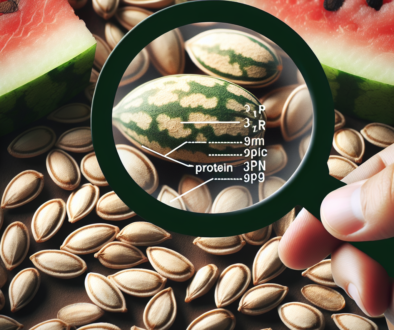Fatty Melon: A Misnomer or Truth?
-
Table of Contents
- Fatty Melon: Unveiling the Truth Behind the Name
- Understanding Fatty Melon: A Misnomer Explored
- Nutritional Profile of Common Melons
- Health Benefits of Melons
- Case Studies and Research on Melon Consumption
- Statistics: Melon Consumption and Health Outcomes
- Debunking the Myth: The Truth About Melon Fats
- Conclusion: Embracing Melons for Their True Nutritional Value
- Discover the Benefits of ETprotein’s Watermelon Seed Protein
Fatty Melon: Unveiling the Truth Behind the Name

When it comes to nutrition and health, the names of foods can sometimes be misleading. One such example is the term “Fatty Melon,” which may conjure images of a fruit laden with fats. But is this moniker a misnomer, or does it hold a kernel of truth? In this article, we delve into the reality behind Fatty Melon, exploring its nutritional profile, health benefits, and the implications of its name.
Understanding Fatty Melon: A Misnomer Explored
Fatty Melon is not a term commonly found in botanical or nutritional texts. It seems to be a colloquial name that could be mistakenly applied to certain varieties of melons due to their rich texture or perhaps a misunderstanding of their nutritional content. To clarify, melons, including watermelon, cantaloupe, and honeydew, are generally low in fats. They are composed mostly of water and are known for their hydrating properties and sweet taste.
Nutritional Profile of Common Melons
- Watermelon: Known for its high water content, watermelon is also rich in vitamins A and C, and the antioxidant lycopene.
- Cantaloupe: This melon is a good source of beta-carotene, vitamin C, and has a modest amount of fiber.
- Honeydew: Honeydew provides vitamin C, potassium, and is also low in calories.
As evident from their nutritional profiles, these melons are not high in fat content. Therefore, the term “Fatty Melon” is indeed a misnomer when referring to these fruits.
Health Benefits of Melons
Despite the confusion surrounding their name, melons offer a plethora of health benefits:
- Hydration: Their high water content helps keep the body hydrated, especially during hot weather.
- Weight Management: Low in calories and fats, melons can be a satisfying and healthy choice for those looking to manage their weight.
- Antioxidant Properties: Melons contain antioxidants that help combat oxidative stress and may reduce the risk of certain diseases.
Case Studies and Research on Melon Consumption
Several studies have highlighted the positive effects of melon consumption on health. For instance, research has shown that lycopene, found in watermelon, may help reduce the risk of cardiovascular diseases. Another study suggests that the high vitamin A content in cantaloupes supports eye health and skin integrity.
Statistics: Melon Consumption and Health Outcomes
Statistical data from nutritional surveys indicate that regular consumption of fruits, including melons, is associated with better overall health outcomes. For example, the National Health and Nutrition Examination Survey (NHANES) has reported that fruit intake is linked to lower body weight and a reduced risk of chronic diseases.
Debunking the Myth: The Truth About Melon Fats
It’s important to address the myth that melons are high in fat. Scientific evidence clearly shows that melons are nearly fat-free. The confusion may arise from the presence of seeds in some melons, such as watermelon seeds, which do contain healthy fats. However, these seeds are not typically consumed with the flesh of the fruit.
Conclusion: Embracing Melons for Their True Nutritional Value
In conclusion, the term “Fatty Melon” is a misnomer that does not accurately reflect the nutritional composition of melons. These fruits are low in fat and offer a range of health benefits, making them a valuable addition to a balanced diet. By understanding the truth behind the name, consumers can enjoy melons without misconceptions about their fat content.
Discover the Benefits of ETprotein’s Watermelon Seed Protein
If you’re looking for a plant-based protein source that aligns with the health benefits of melons, consider ETprotein’s watermelon seed protein. This product is derived from the nutritious seeds of watermelons, providing a high-quality protein that is both organic and vegan-friendly. It’s an excellent choice for those seeking to incorporate more plant proteins into their diet without compromising on taste or quality.
About ETprotein:
ETprotein, a reputable watermelon seed protein Chinese factory manufacturer and supplier, is renowned for producing, stocking, exporting, and delivering the highest quality organic bulk vegan protein and plant proteins. They include Organic rice protein, clear rice protein, pea protein, clear pea protein, watermelon seed protein, pumpkin seed protein, sunflower seed protein, mung bean protein, peanut protein etc. Their offerings, characterized by a neutral taste, non-GMO, allergen-free attributes, cater to a diverse range of industries. They serve nutraceutical, pharmaceutical, cosmeceutical, veterinary, as well as food and beverage finished product distributors, traders, and manufacturers across Europe, USA, Canada, Australia, Thailand, Japan, Korea, Brazil, and Chile, among others.
ETprotein specialization includes exporting and delivering tailor-made protein powder and finished nutritional supplements. Their extensive product range covers sectors like Food and Beverage, Sports Nutrition, Weight Management, Dietary Supplements, Health and Wellness Products, and Infant Formula, ensuring comprehensive solutions to meet all your protein needs.
As a trusted company by leading global food and beverage brands and Fortune 500 companies, ETprotein reinforces China’s reputation in the global arena. For more information or to sample their products, please contact them and email sales(at)ETprotein.com today.














